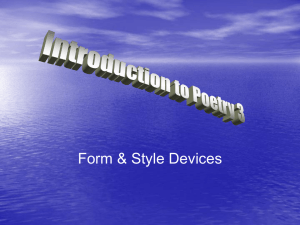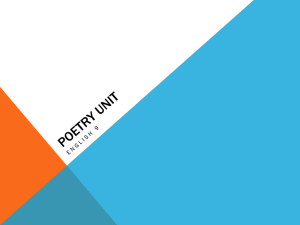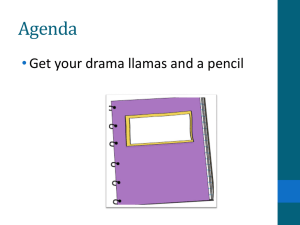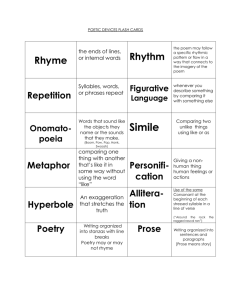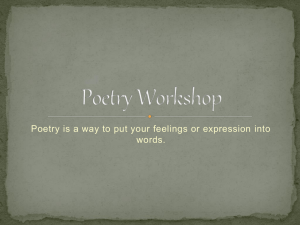Document 17612883
advertisement
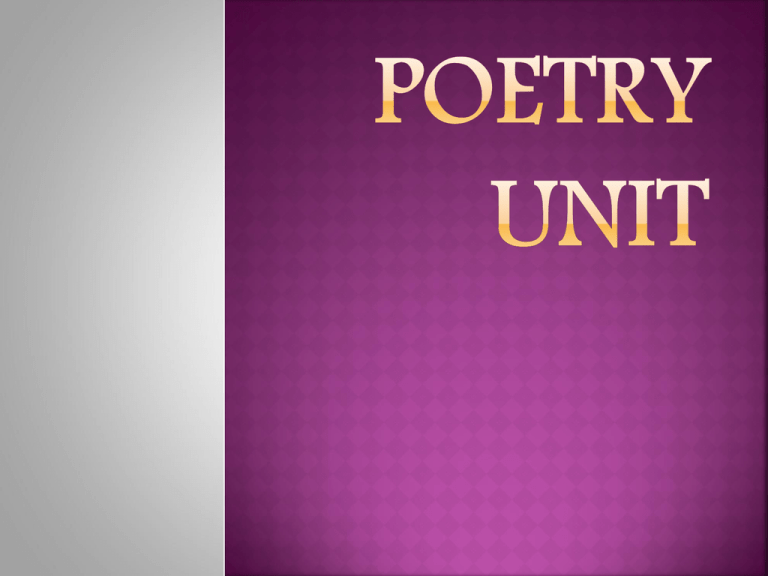
Poetic Devices- Writing practices used by poets to create the different types of poetry Imagery: Language that appeals to the 5 senses Symbolism: The representation of something using symbols or hidden meaning Word Choice: The careful selection of words to create the desired tone and meaning Figurative Language: Language that means more than what is said on paper. A deeper or hidden meaning is present. Rhyme - the repetition of sounds at the ends of words, such as pool, rule, and fool. Rhyme Scheme The rhyming pattern within a poem. Humpty Dumpty sat on a wall Humpty Dumpty had a great fall All the King’s horses & all the King’s men Couldn’t put Humpty Dumpty together again. AA BB CC DD AB AB AB ABCB AA BB C Little Miss Muffet Sat on a tuffet Eating her curds and whey Along came a spider Who sat down besde her And frightened Miss Muffet away. Rhythm - the beat created by the pattern of stressed and unstressed syllables. Meter regular rhythm Repetition (Anaphora) Using any element of language – a sound, word, idea, etc…– more than once for effect or emphasis. Alliteration the repetition of sounds in the beginning of words: lovely lonely lights. Simile- a comparison of two unlike things using like or as She is as slow as a turtle. Metaphor – a comparison of two unlike things without using like or as He was a monkey in the trees. Personification– gives human qualities to non-human things The ocean crashed angrily during the storm. Hyperbole-An If extreme exaggeration! I’ve said it once, I’ve said it a thousand times! Idiom-a saying that is used to get a point across. -usually specific to one language I realized I was in a pickle as soon as the test began. Oxymoron –Opposites used together in contradiction Example: Jumbo Shrimp. Onomatopoeia– words that sound like what they represent Example: Crackle, boom, bang! Narrative poetry tells a story in verse. Narrative poems often have similar elements to a short story, such as plot and characters. A ballad is a form of narrative poetry which is often set to music. Concrete poems -poems shaped to look like their subjects. The poet arranges the lines to create a picture on the page. Green and speckled legs, Hop on logs and lily pads Splash in cool water. Haiku - a 3 line Japanese poem. The first and the third lines each have 5 syllables and the second line has 7. Limerick - a humorous, rhyming, fiveline poem with a specific rhythm pattern and rhyme scheme (AABBA). There once was a fellow named Tim whose dad never taught him to swim. He fell off a dock and sunk like a rock. And that was the end of him. Free Verse – poetry without a standard rhythm or rhyme; does not follow rules Sonnet – “little song” A 14 line poem that expresses a single, complete thought William Shakespeare (1564-1616) From fairest creatures we desire increase, That thereby beauty’s rose might never die. But as the riper should by time decease, His tender heir might bear his memory: But thou, contracted to thine own bright eyes, Feed'st thy light’s flame with self-substantial fuel, Making a famine where abundance lies, Thyself thy foe, to thy sweet self too cruel. Thou that art now the world’s fresh ornament And only herald to the gaudy spring, Within thine own bud buriest thy content And, tender churl, mak'st waste in niggarding. Pity the world, or else this glutton be, To eat the world’s due, by the grave and thee. Couplet- 2 rhyming lines of poetry written back-to-back Shel Silverstein I have the measles and the mumps, a gash, a rash and purple bumps. You say today is...Saturday? G'bye, I'm going out to play! Quatrain- a stanza or poem of 4 lines, usually with an alternating rhyming pattern Shakespeare Donna Brock The mountain frames the sky,A As a shadow of an eagle flies by,A With clouds hanging at its edge,B A climber proves his courage on its rocky ledge.B Shall I compare thee to a summer's day?A Thou art more lovely and more temperate:B Rough winds do shake the darling buds of May,A And summer's lease hath all too short a dateB
